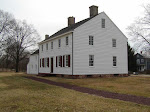- The Wallace House and Old Dutch Parsonage State Historic Sites, located in Somerville, are sites of historic significance to New Jersey and its place in American history.
- The Wallace House has been a house-museum for over 110 years, the Old Dutch Parsonage has been preserved for almost as long.
- Both Wallace House and Old Dutch Parsonage were preserved through the efforts of local citizens and were separately deeded to New Jersey in 1948 in order to preserve them for posterity.
- The Wallace House and Old Dutch Parsonage are both listed on the New Jersey and National Registers of Historic Places.
- The Wallace House was completed in 1776 as Hope Farm for John Wallace, and General George Washington leased the house for use as his headquarters during the Continental Army’s Middlebrook Winter Encampment (called a Cantonement), December 11, 1778, to June 3, 1779. It is arguably the most important Revolutionary War site in Somerset County, and the key site of the surviving sites of the Cantonement.
- The Wallace House is one of the best preserved and original examples of Georgian architecture in New Jersey and retains 90% of its original historic fabric. It contains many irreplaceable artifacts and documents.
- The Old Dutch Parsonage is a brick Georgian building, constructed in 1751 with funds from three Dutch Reformed Church congregations of the Raritan Valley, and was first occupied by the Reverend Mr. John Frelinghuysen and his family.
- The Old Dutch Parsonage has a Rutgers connection. In 1754, the second occupant of the parsonage, Reverend Mr. Jacob Hardenbergh, was one of the signers of Queens College charter (1766) and later its first college President. Old Quessn is known today as Rutgers, The State University of New Jersey.
- The Wallace House and Old Dutch Parsonage are historic sites within the Crossroads of the American Revolution National Heritage Area (NHA) as designated in 2005. The area highlights New Jersey’s Revolutionary War history.
- These sites draw tourism to Somerville and the surrounding area throughout the year and provide educational opportunities to local school groups, scouts, and others to experience state and national history first hand.
- The Somerville District Management Corporation is designated by the Borough of Somerville to preserve and revitalize the Special Improvement District that encompasses Downtown Somerville and reaches to the border of the Historic Sites; closing the sites will hamper these local efforts.
- The State itself through its planning and policies has deemed the Borough of Somerville and surrounding areas, as areas of major significance through designations granted through its Main Street program, and State Planning and Redevelopment Plan (Regional Center, PA1 Metropolitan Planning Area).
- Closure of these sites is fiscally shortsighted and would have negative fiscal effect on the sites. Already operating on a minimal budget, the sites would continue to need maintenance, security, and require their contents to be preserved and protected; costs likely to be more than the annual operating budget. Unless the state irresponsibly abandons the sites and their collections, no savings will result, and significant additional costs are likely to be incurred should the sites ever be re-opened.
- Closure of these sites would represent the loss of an irreplaceable cultural resource to the community.
- Closure of these sites would negatively affect tourism, and the image of the state, region and Borough.
- Closure of these sites sends a negative message to our citizens, visitors and schoolchildren that our history is unimportant, and the commitment the State made to preserve these sites can be negated;.
- Closure of these sites would negatively affect business in the Special Improvement District, which borders the sites and eliminate a major tourism draw to the downtown.
- Closing of these sites would be an inducement to vandalism, and crime; such damage is likely to be more costly to repair than maintaining preservation and security.
- Closure of the sites means the state retains ownership of land removed from the tax rolls of Somerville that provides absolutely no real or “added value” compensation to the town for its loss of revenue.
- Closing of these sites will negatively impact on the residential neighborhood in which they are located and the corresponding value and tax assessments of the homes located there.
- The Somerville Borough Council vigorously opposes the closing of these sites.
Tuesday, April 8, 2008
Reasons to Keep the Sites Open
Subscribe to:
Post Comments (Atom)








No comments:
Post a Comment